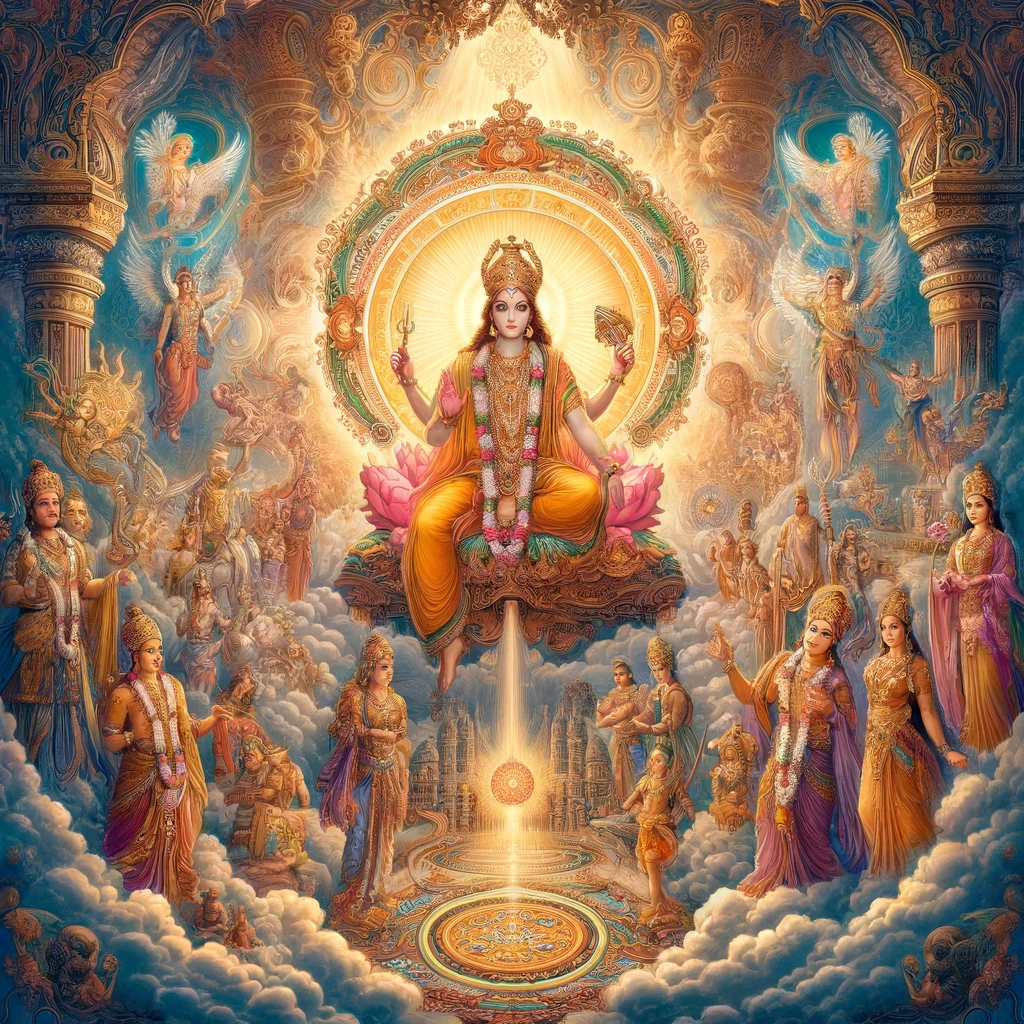ಅಚ್ಯುತಃ ಪ್ರಥಿತಃ ಪ್ರಾಣಃ ಪ್ರಾಣದಃ ವಾಸವಾನುಜಃ
ಅಪಾಂನಿಧಿಃ ಅಧಿಷ್ಟಾನಮ್ ಅಪ್ರಮತ್ತಃ ಪ್ರತಿಷ್ಠಿತಃ || 35 ||
acyutaḥ prathitaḥ prāṇaḥ prāṇadaḥ vāsavānujaḥ
apāṃnidhiḥ adhiṣṭānam apramattaḥ pratiṣṭhitaḥ || 35 ||
acyutaḥ (ಅಚ್ಯುತಃ)
The name 'Acyutaḥ' of the Lord is repeated three times in the Sahasranama (at positions 100, 319, and 556). After completing any mantra or recitation, this name is part of the three names mentioned in the expiatory prayer for correcting errors in pronunciation: 'Acyutāya Namaḥ, Anantāya Namaḥ, Govindāya Namaḥ, Acyutānanta Govindebhyo Namaḥ.' The Lord, known as Acyuta, is free from falling and redeems us from all errors in utterance. Moreover, as stated by Vedavyasa in the Puranas:
"ಅಚ್ಯುತಾನಂತ ಗೋವಿಂದ ನಾಮೋಚ್ಚಾರಣ ಬೀಶಿತಾಃ ನಶ್ಯಂತಿ ಸಕಲಾಃ ರೋಗಾಃ ಸತ್ಯಂ ಸತ್ಯಂವದಾಮ್ಯಹಂ" 'Acyutānanta Govinda nāmoccāraṇa bīśitāḥ, Naśyanti sakalāḥ rogāḥ, Satyaṁ satyaṁ vadāmyaham,' meaning the recitation of these names of the Lord causes all diseases to flee; this is the truth. For this to occur, one must have profound faith (involvement) in the Lord and the capacity to receive (receiving power). The perfect Lord is the remover of all diseases. Thus, the Lord, who is eternally unchanging and redeems the devotees from falling, is Acyutaḥ.
prathitaḥ (ಪ್ರಥಿತಃ)
Prathitaḥ means 'the famous one.' In the Bhagavad Gita, Sri Krishna states:
ಯಾಸ್ಮಾತ್ ಕ್ಷರಮತೀತೋssಹಮಕ್ಷರಾದಪಿ ಚೋತ್ತಮಃ, ಅತೋssಸ್ಮಿ ಲೊಕೇ ವೇದೇ ಚ ಪ್ರಥಿತಃ ಪುರುಷೋತ್ತಮಃ (ಅ-೧೫ ಶ್ಲೋ-೧೮)
'Yāsmāt kṣaram atīto'ham akṣarād api cottamaḥ, Ato'smi loke vede ca prathitaḥ puruṣottamaḥ' (Gita 15:18), which means, 'I am beyond the perishable and even greater than the imperishable. Therefore, I am known in the world and in the Vedas as Puruṣottama.' Thus, the Lord, the supreme soul among all souls, the subject of all Vedas, and the referent of all words, is Prathitaḥ.
prāṇaḥ (ಪ್ರಾಣಃ)
The Lord is the 'all-animating' power. He resides within everyone, inspiring and controlling all movement. The Lord is the one who initiated motion in the universe. As previously mentioned, 'ṇa' implies 'well-being' and 'bliss'. The Lord, embodying perfect bliss and well-being, is Prāṇaḥ.
prāṇadaḥ (ಪ್ರಾಣದಃ)
Prāṇadaḥ means the giver of life. The Lord is the one who bestows the life-force, the regulating power of the universe, upon us. In the Upanishads, this life-force is referred to as 'Prāṇa'. This signifies the power that disseminates the qualities of the Lord. The Lord, who bestowed such a universal teacher upon the world, is Prāṇadaḥ.
vāsavānujaḥ (ವಾಸವಾನುಜಃ)
At first glance, Vāsavānujaḥ seems to mean 'the younger brother of Indra.' However, here 'Vāsava' refers to the collective of the Vasus, which denotes 'a group of deities' rather than the eight Vasus specifically. The Lord is Vāsava, the ruler of the cosmic and microcosmic entities, controlling the universe and the individual beings. When such deities pray, the Lord descends to Earth in response to their prayers and to favor the wise. Therefore, the Lord who incarnates in response to the prayers of these deities is Vāsavānujaḥ.
apāṃnidhiḥ (ಅಪಾಂನಿಧಿಃ)
Apāṃnidhiḥ means 'the abode of water'. The Lord is present in the ocean, in Varuna, the deity of the sea, and in all bodies of water, making Him Apāṃnidhiḥ. 'Āp' refers to something that is drunk. Water is the substance we drink to sustain life. For the wise, the constant object of absorption (śravaṇa) is the Lord's infinite qualities. The Lord is the sole abode of these endless qualities. Similarly, all our righteous deeds ultimately converge towards the Lord. That’s why at the end of every worship, we say 'Kṛṣṇārpaṇa mastu,' meaning everything is offered to Krishna. Therefore, the Lord is the abode of all righteous deeds. Thus, as the abode of deeds, qualities, deities, and water, the Lord is Apāṃnidhiḥ.
adhiṣṭānam (ಅಧಿಷ್ಟಾನಮ್)
Adhiṣṭānam means the foundation or support for everything. The Lord is the fundamental basis of every entity. The Earth is borne by 'Śeṣa', and 'Vāyu' (the wind) supports Śeṣa, but the ultimate support for Vāyu is the Lord Himself. Thus, as the foundation for the entire universe and superior to all, the Lord is Adhiṣṭānam.
apramattaḥ (ಅಪ್ರಮತ್ತಃ)
Apramattaḥ means one who never loses vigilance or alertness. The Lord is ever vigilant and never errs. He is always protecting us from negligence, transcending all qualities and embodying bliss.
pratiṣṭhitaḥ (ಪ್ರತಿಷ್ಠಿತಃ)
Pratiṣṭhitaḥ means the one who is self-established and in whom everything is established. The Lord resides as the immanent form within every being. He exists within us as our innermost self, as our own image, and is the closest to our true nature. In this way, the Lord, as the indwelling spirit within every creature, is Pratiṣṭhitaḥ.


